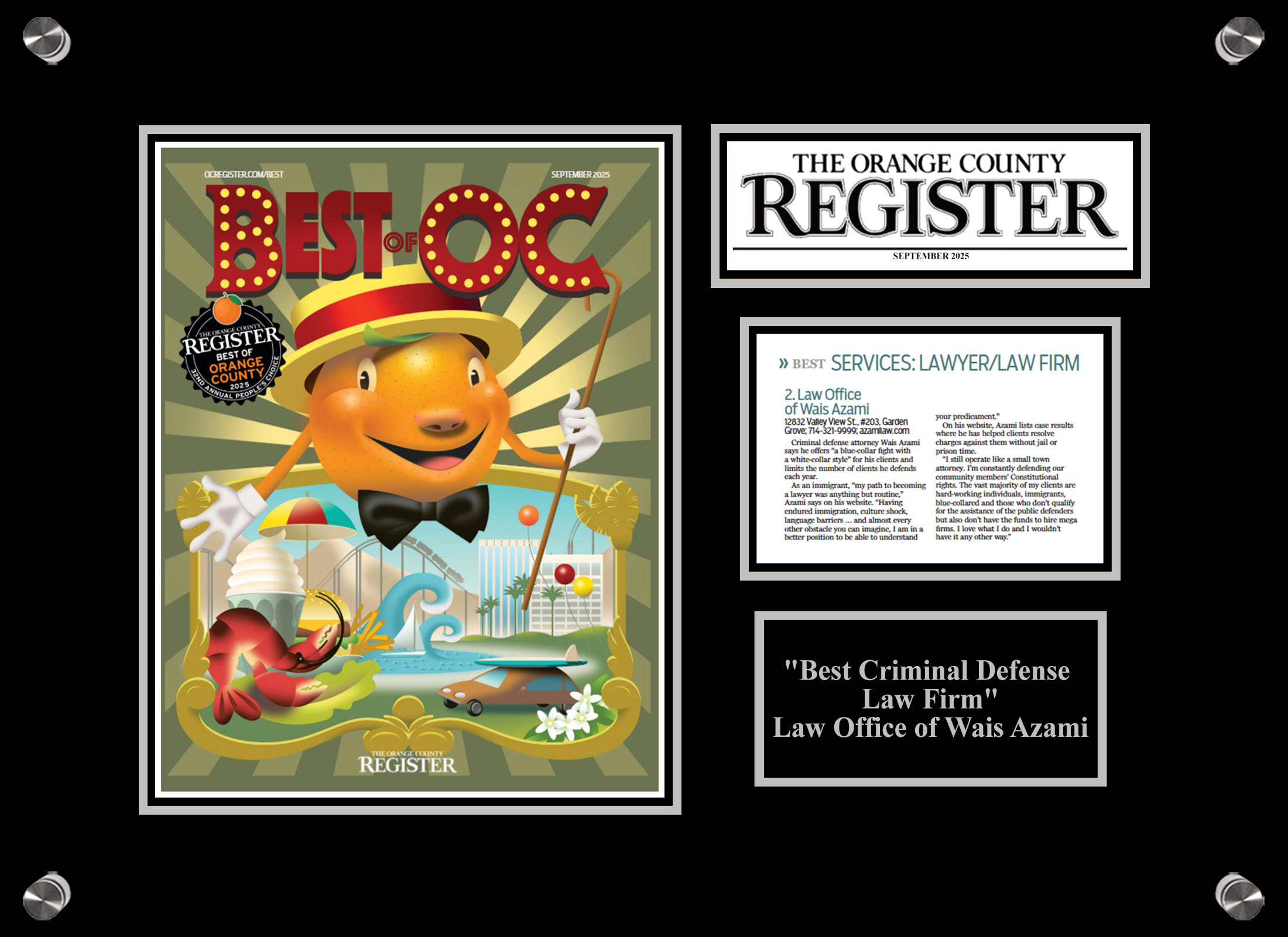Best of OC: Best Lawyer - Law Firm 2024 & 2025
Assault and Battery
Wais Azami is an experienced assault and battery attorney in Orange County with years of experience. He has led many of these charges into dismissals.
Assault and Battery Types
Someone who commits a simple assault or battery in California generally is guilty of a misdemeanor, although certain assault and battery crimes can be charged as a misdemeanor or a felony, at the prosecutor’s discretion (these crimes are called “wobblers”). When a simple assault or battery is charged as a felony, the court might reduce the crime to a misdemeanor during the case proceedings.
For more information on assault with a handgun, semi-automatic weapon, or other firearm, see Assault with a Firearm in California. Assault And Battery Charges.
SIMPLE ASSAULT
Taking a swing at someone during a heated argument (but missing) is a simple assault in California, as long as the intended victim was within striking distance. Though words alone are not assault, threatening to hit someone with an object is considered assault when accompanied by an action that shows intent to carry out the threat. For assault charges, the identity of the victim is an important factor in determining the severity of the offense and the possible punishment.
Assault against many healthcare providers providing emergency treatment outside a hospital or clinic, and assault against many public workers who are engaged in the performance of their duties, carry more severe penalties than simple assault, as long as the defendant knew or should have known that the victim was a healthcare provider or public worker engaged in performing his duties. These healthcare providers and public workers include, among others:
- doctors and nurses
- emergency medical technicians and paramedics
- school employees
- fire fighters
- lifeguards
- animal control officers
- highway workers
- members of the United States military, when the assault is motivated by the fact of service in the military
- public transportation employees, and
- probation department employees.
(Cal. Penal Code § § 241, 241.1, 241.3, 241.5, 241.6, 241.8).
Wobbler Assaults
The following simple assaults are “wobblers,” which can be charged as felonies or misdemeanors:
- assault against a custodial officer such as a corrections officer at a jail or prison
- assault against a school district police officer, and
- assault against a juror or alternate juror by a party in the case.
(Cal. Penal Code § § 241.1, 241.4, 241.7, 1170).
SIMPLE BATTERY
Striking another person with a fist during an argument or shoving someone are straightforward examples of battery. Pushing someone or hitting someone with a small object that physically injures the other person are also examples of battery.
As with assault, the identity of the victim is an important factor in determining the severity of a battery offense and the possible punishment. Battery against many public workers and healthcare providers during the performance of their duties, including fire fighters, lifeguards, public transit workers, animal control officers, and probation department employees, carries more severe penalties than simple battery against other victims, if the person committing the offense knew or should have known that the victim was such a public worker engaged in performing his duties.
(Cal. Penal Code § § 242, 243).
The following simple battery offenses are misdemeanors, but subject to more severe penalties than simple battery against other victims. They involve assaults against:
- an intimate partner or certain family members (domestic violence battery)
- an elderly person or disabled adult
- a public transit passenger
- anyone on public transit property or in a public transit motor vehicle
- a school employee while performing his duties or in retaliation for actions taken by the school employee while performing his duties
- a highway worker
- a sports official while performing his duties at a sporting event, and
- someone on school property, in a public park or on hospital grounds.
(Cal. Penal Code § § 243, 243.25, 243.3, 243.35, 243.6, 243.65, 243.8, 243.2).
Wobbler Batteries
The following battery offenses can be charged as felonies or misdemeanors:
- against a law enforcement officer while the officer is performing his duties
- against a juror or alternate juror by a party in the case
- battery (resulting in injury requiring medical treatment) against various public workers or healthcare providers, and
- battery (resulting in injury requiring medical treatment) against a school employee while performing his duties, or in retaliation for action taken when he was performing his duties.
(Cal. Penal Code § § 243.1, 243.7, 243, 243.6).
INTENTIONAL CONDUCT REQUIRED
For an act to constitute criminal assault or battery, the conduct must be intentional. An action that is accidental is not a crime. For example, if someone brushes up against a friend in a sexually suggestive manner as a joke, that person may not have criminal intent. An offender’s claim that he did not know that an intentional, angry and/or menacing act was against the law, however, is usually not a defense and does not negate intent.
PENALTIES FOR ASSAULT IN CALIFORNIA
A person who is convicted of simple assault faces the following possible penalties:
- up to six months in jail
- a fine up to $1000 (or $2000 if the assault is committed against a parking officer — someone who issues parking tickets), and
- probation up to six months.
(Cal. Penal Code § 241).
Possible penalties for a simple assault against a healthcare provider or public worker (listed above) while performing his duties, as referenced above, include:
- up to one year in jail
- a fine up to $2000, and
- probation up to one year.
(Cal. Penal Code § § 241, 241.5, 241.6).
Wobbler assaults carry the following possible penalties:
- up to one year in jail or
- sixteen months, two years, or three years to be served in the county jail or state prison, depending on the offender’s criminal history
- a fine up to $2000, and
- probation up to one or three years.
(Cal. Penal Code § § 241.1, 241.2, 241.4, 241.7, 241.8).
PENALTIES FOR BATTERY IN CALIFORNIA
The basic penalties for simple battery charged as a misdemeanor include:
- up to six months in county jail
- fine up to $2000, and
- probation up to six months.
(Cal. Penal Code § 243).
The enhanced penalty for other battery offenses (such as battery against a healthcare provider or public worker, domestic violence battery, and battery on school property) includes:
- up to one year in county jail
- fine up to $2000, and
- probation up to one year.
(Cal. Penal Code § § 243, 243.2, 243.25, 243.3, 243.35, 243.6, 243.65, 243.8).
Penalties for wobbler batteries charged as a felony include:
- sixteen months or two or three years to be served in the county jail or state prison, depending on the offender’s criminal history and pending criminal charges
- a fine up to $2000 (up to $5000 when the victim is a juror, or $10,000 when the victim is a public transport worker or passenger) and
- probation up to three years.
(Cal. Penal Code § § 1170, 243).
Penalties for Battery Against a Law Enforcement Officer
If the victim of a simple battery charged as a felony is a law enforcement officer engaged in performing his duties (even if he happens to be working as a private security officer), and the offender knew or should have known the victim was a police officer, the possible penalties are:
- sixteen months or two or three years in the county jail or state prison, depending on the offender’s criminal history and pending criminal charges
- a fine up to $10,000, and
- probation up to three years.
(Cal. Penal Code § 243).
PROBATION
The court can impose probation instead of jail time for an entire sentence, or after the person convicted has spent some time in jail. For instance, a judge in an assault or battery case in California can order 30 days in jail and five months’ probation.
A person on probation must meet regularly with a probation officer and comply with conditions set by the court, such as no further arrests or convictions, attending counseling, performing community service, or electronic home detention, commonly referred to as “house arrest.” Under electronic home detention, the person on probation wears an electronic monitoring device or “ankle bracelet” and usually is restricted to home and work. If a person violates a condition of probation, he can be arrested and required to serve the remainder or a remaining part of his sentence in jail.
RESTITUTION
A person convicted of assault or battery is required to pay restitution, which means reimbursing the victim for any expenses resulting from the crime, such as the cost of medical treatment or counseling. The court can require someone convicted of a misdemeanor to pay between $150 and $1,000 in restitution; and someone convicted of a felony to pay between $300 and $10,000, depending on the damages to the victim and other factors. Restitution orders are the norm—the court may elect not to require restitution only in very unusual situations for compelling reasons.
(Cal. Penal Code § 1202.4).
PLEAS AND PRE-TRIAL OPTIONS
If you are facing an assault or battery charge, an attorney can investigate the case and determine if you were wrongfully charged or there are other reasons why the case should be dismissed before trial. If the charges are not dismissed, an attorney may be able negotiate a plea bargain with the prosecutor on your behalf or prepare a defense and represent you at trial if you believe you have been wrongly accused or if there are no reasonable plea options. Prosecutors often will negotiate and agree to a let the defendant plead guilty to a different, less serious crime. Or, the prosecutor may agree to a lighter sentence, such as probation, in exchange for a plea of guilty to the charge.
THE VALUE OF GOOD REPRESENTATION FOR ASSAULT AND BATTERY
A conviction for a misdemeanor or felony becomes part of your permanent criminal record, which can have a serious impact on your life. If you are convicted later of another crime, the court can consider your prior conviction and impose a harsher sentence in the new case. A criminal record – even a misdemeanor conviction –can hurt you when you are looking for a job or applying to rent a house or apartment.
A convicted felon loses the right to vote, hold public office, serve as a juror, and carry or own firearms. In certain circumstances, a felony conviction also can result in loss of a professional license. Felons who face criminal charges later may find that the new charges are more serious because of their prior conviction(s).
Only someone familiar with the local criminal court system and cases like yours will know how good your chances are for a favorable outcome in court or at the negotiating table. A knowledgeable attorney will take all of this into consideration, assist you in making decisions about your case, and protect your rights.














